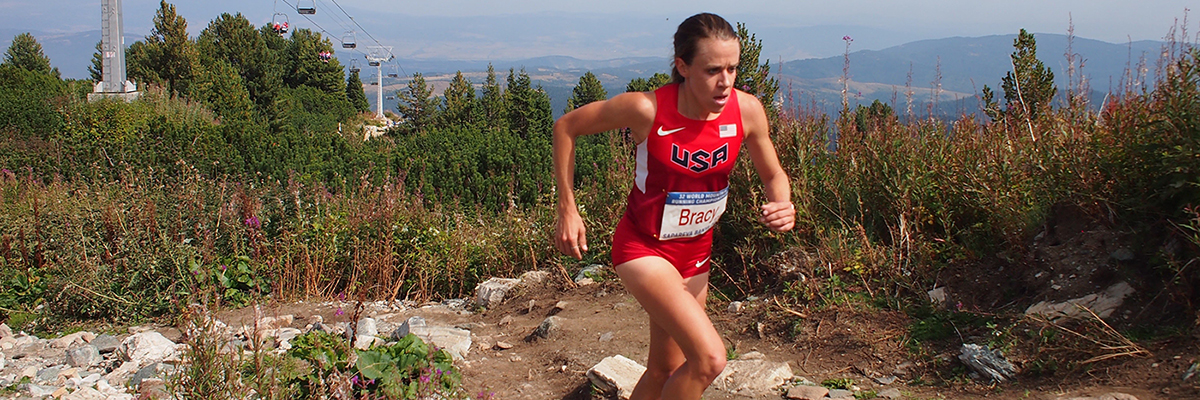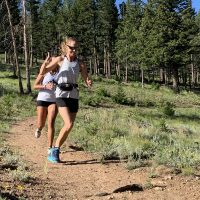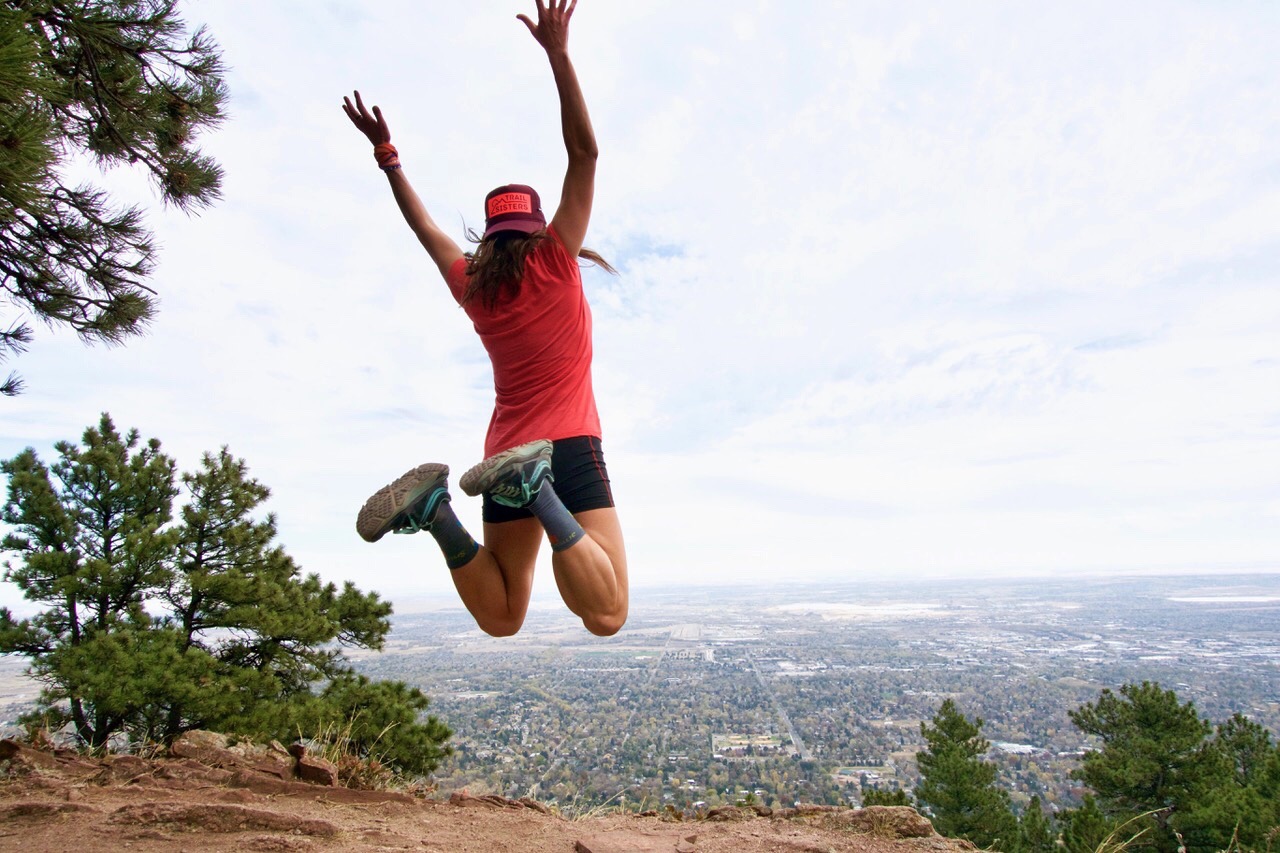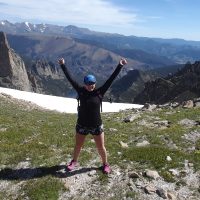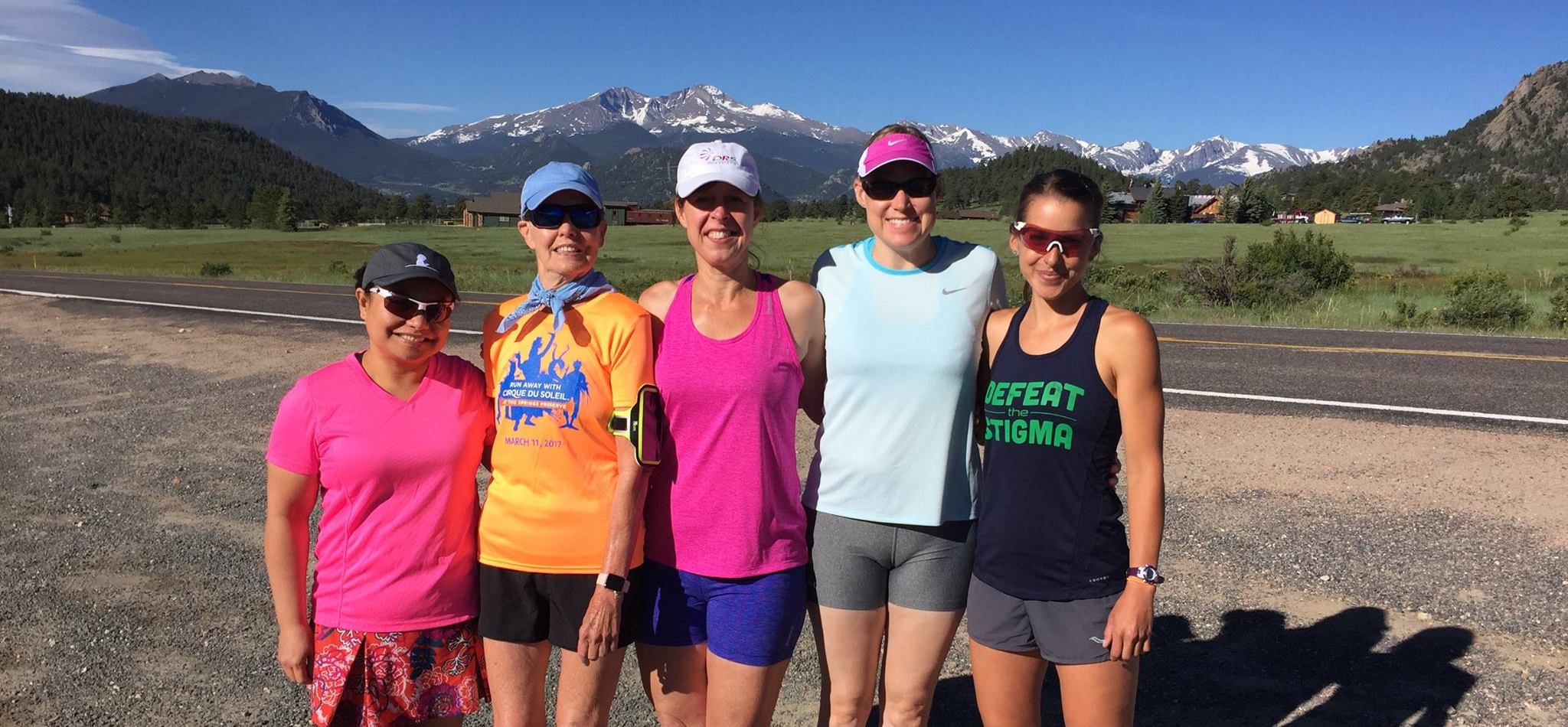Our positive running story this time is on Addie Bracy, current and two-time US Mountain Running Champion, and head XC coach for Erie high school in Colorado. Addie has been an Olympic trials qualifier, had great success at various distances on track and road, and then in 2016 was considering pulling out of competitive running. Then she serendipitously turned to mountain and trail running, and found a way to reconnect with what she loved about running. We were fortunate to be able to work alongside Addie at a recent women’s running camp with Active at Altitude, and found her take on running to be very refreshing, and also very inspiring! We followed up with an interview with Addie post camp, and here is the result.
You have been a long time track and road runner. Can you share some of the highs from that part of your career?
I think two of the most memorable moments had to do with qualifying for the Olympic Trials. In 2012 I ran a 30 second PR to run 32:37 in the 10k at the last chance meet to qualify for the 2012 Olympic Track and Field Trials. I had been injured all winter and had to pull out of the 2012 Olympic Trials marathon 3 weeks before the race after some of the best training I had ever had. So, not only had I already missed the chance to run at one Olympic Trials event, but I had missed a lot of training and I wasn’t sure that I had the fitness to run the time necessary. So, it was extremely exciting and encouraging to earn my chance to compete at the Olympic Trials at Hayward Field and I’ll definitely never forget it.
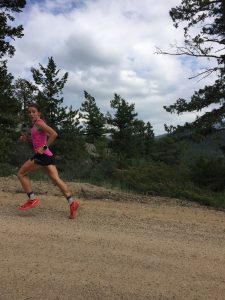
In a similar situation, I was running the CIM marathon in December of 2014 to try and get my 2016 Olympic Trials marathon qualifier out of the way. Myself and a teammate were going for the A standard of 2:37. We had put in a great training cycle and I felt like I was certainly ready. For whatever reason, my nerves were very bad the two days before the race. Two nights before, I didn’t sleep much. The night before the race I knew we were going to have to get up at 4:30am to eat and get dressed and catch the bus to the starting line. I was so nervous for the race and stressed about getting some sleep that by 2:30am, I still hadn’t fallen asleep at all. I ended up getting up and going out to do a jog and some strides in front of the hotel around 3:00am. I didn’t sleep at all. I had a minor panic attack about how tired and sluggish I felt and didn’t know if I was going to be able to complete the race, much less run the time I had trained so hard for. While I had to work pretty hard and I didn’t feel the best I ever had, I ended up running 2:35 and a full minute under the Olympic Trials A standard. Both of these events just confirmed me to that things don’t always have to go perfectly for you to get the best out of yourself.
You said that you decided to stop track and road when you felt that you no longer enjoyed it. What do you think took the joy out of that kind of running for you?
Track and road racing can be very objective. To qualify for big championships races, it’s about hitting specific times. So, I think I found myself so focused on those times which eventually begin to feel like I wasn’t even creating my own goals for myself. I was trying to have performances that were outlined by someone else, not me. I begin to feel like every time I raced and didn’t hit one of those times that I was failing. It’s also such a concrete marker of performance that it’s easy to compare your current self with your past self. I was running slower times than I had in a very long time. Even though there were times when I thought I ran a very good race given a certain set of factors, if I didn’t run a PR I still felt like I was going backwards. The way that I started to approach racing was “am I going to succeed or fail?” and the way that I was defining each of those things made it impossible for me to enjoy racing. I started to put too much pressure on myself and slowly I started to dislike competing which was always my favorite part of the sport. I knew then that it was time for something to change.
You literally jumped into the US Mountain Running Championships in 2016, and won your first trail race! You said that you felt physically under-prepared for the race, while at the same time very excited and completely connected with the joy for this new form of running to you. Can you share some of what happened that day, and how it has guided your running since?
That race was definitely an important turning point in my life. About 3 weeks before, I had quit my track season and was considering being done with competitive running. I still had a good level of fitness from the track season, but I was certainly not physically prepared for the demands of mountain running. Nor did I even know what mountain running was until I ran the course the day before. When I saw just how steep those hills were, I was honestly terrified. But, I was excited by the blank slate. One thing that has never changed is that I love to run and I love to challenge myself. While I lost my love a little bit for the very time-based events, I never stopped loving to work hard and push myself. So, I saw this as a chance to do that with absolutely no measuring stick present. I had never done it and therefore had nothing to compare myself to. That hadn’t happened for me in the sport of running in a very long time. So, when the gun went off, I just did what I always loved to do and I competed. I didn’t look at splits. I didn’t analyze each mile. I just pushed myself and tried to enjoy the challenge. While in some ways it was surprising that I won that race, in other ways it wasn’t. It just proved to me how important it is to free yourself from all those fears and restraints and expectations and just let your body do what it already loves doing. Since then, I have fought really hard to maintain that mindset. I am much less structured than I used to be. That doesn’t mean that I don’t work as hard. When I’m out training, I’m very focused on what I’m doing. But, I don’t let my workouts or my races take up so much space in how I define my self worth or my joy, anymore. The crazy thing is that not only am I living a much more balanced and happy life outside of running, but I’m also performing better than I have in a years. Perhaps the even crazier thing is that I went so long without seeing how much those two things are connected.
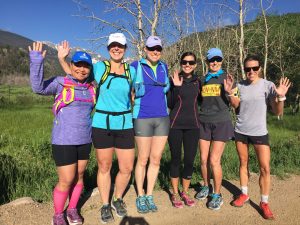
You went to the World Mountain Running championships in 2016. What was it like to be competing at that level, and how did you manage the balance between wanting to perform at your best while still enjoying the race?
That’s a great question because I would probably pinpoint that race as a time when I let the “old me” sneak back in. Until that point I had run two trail races and done very well in both. They were ones in which I wasn’t expecting a certain result and just had a blast running without pressure. However, once I got to the World Championships I let the pressure and expectations sneak back in. Several people had told me that they thought I could podium at the event. And, instead of using that as something positive, I used it to put pressure on myself. I started to feel very nervous several days before the race and became very focused on how inexperienced I was – obviously a very negative place to direct my energy. When the gun went off, I frantically put myself in the top 3 because that was the expectation. The whole race I was tense and anxious and when I started to slip out of that position, I found myself in a similar mental spot as on the track and started to fade further and further back. However, what I am very proud of in that race is that I was able to catch what I was doing and recognize the self sabotage that was happening. I was able to pick up the pieces a little bit and moved up a little bit in the race to finish 12th overall to help the USA to a bronze medal team finish. However, I do think that if I had run my own race the way that I had been rather than being dictated by outside expectations, I would have performed better. It serves as a good reminder to me of what happens when I let those feelings come back in. I often remind myself that I made this switch to trail and mountain running to reclaim my joy for the sport. If I let those old behaviors filter into this environment, then it may end up becoming what racing on the track did and that’s not what I want.
You repeated the win at the US Mountain Running Championships this year as well, and qualified to return to the World Mountain Running Championships. Was this a surprise to you, how did you prepare for the race, and what do you look forward to about Worlds this time around?
It was definitely a little bit surprising to me mainly because of the 10 days leading up to the race. As far as my training and fitness level, I felt that I was in a good place. But, I had traveled to Spain the week before to compete in the Zegama skymarathon, one of the notoriously tough international trail marathons. It had 16,000 feet of elevation change with 9,000 feet of climbing. The race took me just under 5 hours. I can’t even describe how sore and wrecked my legs were since I had never done anything like that before. I had only done two races that were marathon distance or higher (a 50k) and neither had that much elevation change or gain. So, I made the mistake of not doing my research on Zegama and remembered that I wasn’t that sore after those races and that as long as I took it easy the days between the two races, I would be fine. I didn’t realize how tough Zegama was until I got there. My legs were so sore that I wasn’t able to even go for a run until two days before the race. I was also pretty jet lagged and tired from traveling so far abroad and back in just a week. Another challenge that worried me was the downhill portion of the race. Surprisingly, I felt okay running uphill. But, my quads were the sorest part of my body and they felt absolutely awful on the downhill sections. So, it’s not surprising that I wiped out coming down the decent on the first lap! I’m excited for worlds because I know what to expect this time. I’ve been there before and have competed in several big races since then. So, I feel much more prepared mentally and emotionally. I also think we have a very strong overall team and 2 of the other women have also competed there before. So, we have knowledge and experience on our side!
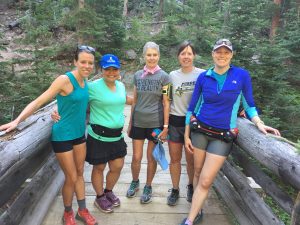 You are now head xc coach at Erie high school. What do you love about coaching high school athletes, and how do you enable them to connect with their joy of running?
You are now head xc coach at Erie high school. What do you love about coaching high school athletes, and how do you enable them to connect with their joy of running?
When I think back on my 17 years as a runner, I realize that some of the most important things I’ve learned in my life were while running. I’ve also learned how those qualities can translate to positive results in other ares of life. For the most part, when I’m running well, I’m also a better student. I have healthier relationships. I’m more productive at work. The sport has taught me so much about commitment, creating a plan and sticking to it, teamwork, and resilience. That’s why I love working with high school athletes. I know that the majority of them do not have aspirations to see how far they can go in running. However, I know that the things that they will learn while training and competing will carry over to other areas of their life and help them find success. I also always stress the importance of joy and fun. While training hard isn’t always fun, most of time it should be or else we aren’t doing it right. I give all my kid’s an open invitation to tell me when things start to feel stale and they aren’t having as much fun. When that happens, I always have something up my sleeve to find the smiles and laughs, again. That’s usually something like a surprise water balloon attack. Or, an unplanned field day competition with events like speed-walking 4 x 100m relay and a plank competition. After something like that, the joy seems to sky rocket again and we can get back to training hard.
We were fortunate that you were able to recently work as a coach at one of our women’s running camps. We had a range of ages for the women from 38 to 70. What did your experience at camp teach you about encouraging women to get connected with the joy of running on trails and exploring their potential?
The thing that is so magical about our sport is that anyone can do it. It’s not like other sports where very few people will play in the World Series or the NBA final. However, tens of thousands of people get to feel the joy of running the Boston marathon or running 5k PR. While the time’s may very, it’s all relative. Being willing to set a concrete goal and working hard to be the best you have ever been at something takes courage whether that is trying to make an Olympic team or trying to complete your first marathon without walking. Seeing others find the same joy that I do when working towards their individual goal is so inspiring. Most people are capable of accomplishing far more than they will ever realize. So, seeing women that are brave enough to start that exploration and push themselves to find out just what their potential might be is so amazing to see.
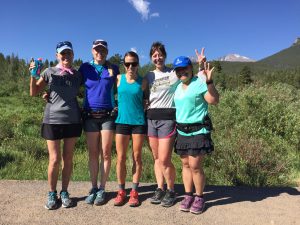 At the women’s running camp we included a guided imagery session for each run to connect with visualizing the run before we actually headed out. Have you ever used visualization or imagery before you run, and how has this been helpful to your running?
At the women’s running camp we included a guided imagery session for each run to connect with visualizing the run before we actually headed out. Have you ever used visualization or imagery before you run, and how has this been helpful to your running?
I have used visualization and it has been very helpful for me. I think many people might think of visualization as useful for the actual competition, but it has so many uses. For the most part, I am pretty good at staying level headed and focused within a competition. However, I don’t always handle the nerves leading up to the race very well. This usually causes me to sleep poorly or be tense and anxious. I often will visualize the night before a race. I will imagine myself being calm and content. I’ll visualize myself getting a good night of sleep and waking up feeling rested and refreshed. That has been super helpful for my pre-race anxiety. I think there are many usual for guided imagery and that every athlete at every level can benefit from its regular usage.
What are your running and personal goals for the rest of 2017?
As far as my running goals, I just want to stay focused on the joy. When I see myself getting away from that I want to be able to bring myself back to what matters and what makes the sport so special for me. My personal goals are to help others find the same in their own lives whether it’s with running or with something else. As a coach, I want to continue to help athletes discover their own capabilities. I am starting a master’s program at the University of Denver in Sport and Performance Psychology in September where I’ll continue to explore the mental and emotional factors that have such a huge impact on performance.
We wish Addie every success at the World Mountain Running Championships for Team USA, her high school coaching at Erie, and with her continued journey into the mental and emotional side of running!
Would you like to be a part of the Positive Running Movement®? Our bi-weekly newsletter contains more positive running stories and tips on how to get the best from your positive mind as an athlete.
Sign up for the newsletter on this page – we look forward to hearing from you!
Terry Chiplin, the visionary behind activacuity, provides positive coaching sessions for clients, working with athletes to enable a positive focus on their status and goals. He can also create personalized guided imagery sessions for clients, delivered as an mp3 audio file that you can listen to on multiple devices.activacuity provides a daily dose of positive guided imagery or visualization sessions. Find out what you can do when you make that mind-body connection – check out our subscription options here.
 You can help raise funds for the American Cancer Society by becoming a subscriber to activacuity®. We are thrilled to announce that from February 1, 2017, we are a partner with the American Cancer Society.Use the code activacssupport2017 when you subscribe for an annual membership through our website, and $10 of your subscription goes to the American Cancer Society. We will also provide a free subscription for activacuity® to a cancer survivor for each paid annual subscription received. The Society will establish a list of cancer survivors that will benefit from the partnership, using the Patient Navigator Program.
You can help raise funds for the American Cancer Society by becoming a subscriber to activacuity®. We are thrilled to announce that from February 1, 2017, we are a partner with the American Cancer Society.Use the code activacssupport2017 when you subscribe for an annual membership through our website, and $10 of your subscription goes to the American Cancer Society. We will also provide a free subscription for activacuity® to a cancer survivor for each paid annual subscription received. The Society will establish a list of cancer survivors that will benefit from the partnership, using the Patient Navigator Program.Our goal is to raise $5000 for the Society over the partnership period.

